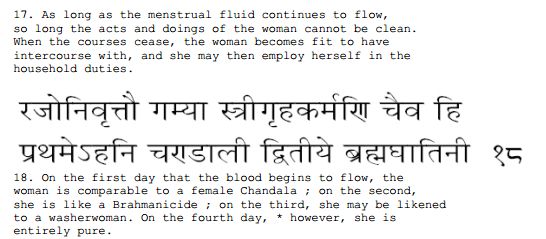During courses a woman is considered very "impure"(the degree of impurity is described in one of the verses given below).The Scriptures even say that touching their husbands during those days is an offence.Participating in religious activity of any kind is strictly prohibited,which should only resume once the courses are over.
Following are some verses from Parashara Smriti(Chapter 7):
A woman in her monthly courses, is restored to purity after having washed herself, on the fourth day. When the courses actually cease,
however, it is then that she should engage herself in the
performance of the rites due to the manes and the gods.
As long as the menstrual fluid continues to flow, so long the acts and doings of the woman cannot be clean. When the courses
cease, the woman becomes fit to have intercourse with, and she may
then employ herself in the household duties.
On the first day that the blood begins to flow, the woman is comparable to a female Chandala ; on the second, she is like a
Brahmanicide ; on the third, she may be likened to a washerwoman. On
the fourth day, * however, she is entirely pure.

If some woman had done a sankalpa(taken a vow) for doing a prolonged Vrata which is extended over months(like say 16 monday fasts etc),then she can skip fasts on the days which coincide with her courses without breaking the vow(but she should complete as many fasts as she promised during taking the vow).
Update- From the Vasistha Dharma Sutras:
- A woman in her courses is impure during three (days and) nights.
- (During that period) she shall not apply collyr ium to her eyes, nor anoint (her body), nor bathe in water; she shall sleep on the
ground; she shall not sleep in the day-time, nor touch the fire, no r
make a rope, nor clean her teeth, nor eat meat, nor look at the
planets, nor smile, nor busy herself with (house-hold affairs), nor
run; she shall drink out of a large vessel, or out of her joined hands, or out of a copper vessel.
Now,as you should be knowing,before participating in a religious rite(including a fast ) purity of body is the first requirement.So,bathing is a must.
But, as you can see both bathing as well as brushing of teeth are prohibited on those 3 days.Needless to say,that performance of vratas or engaging in any kind of religious activities will not thus be possible on those 3 days for any woman.
